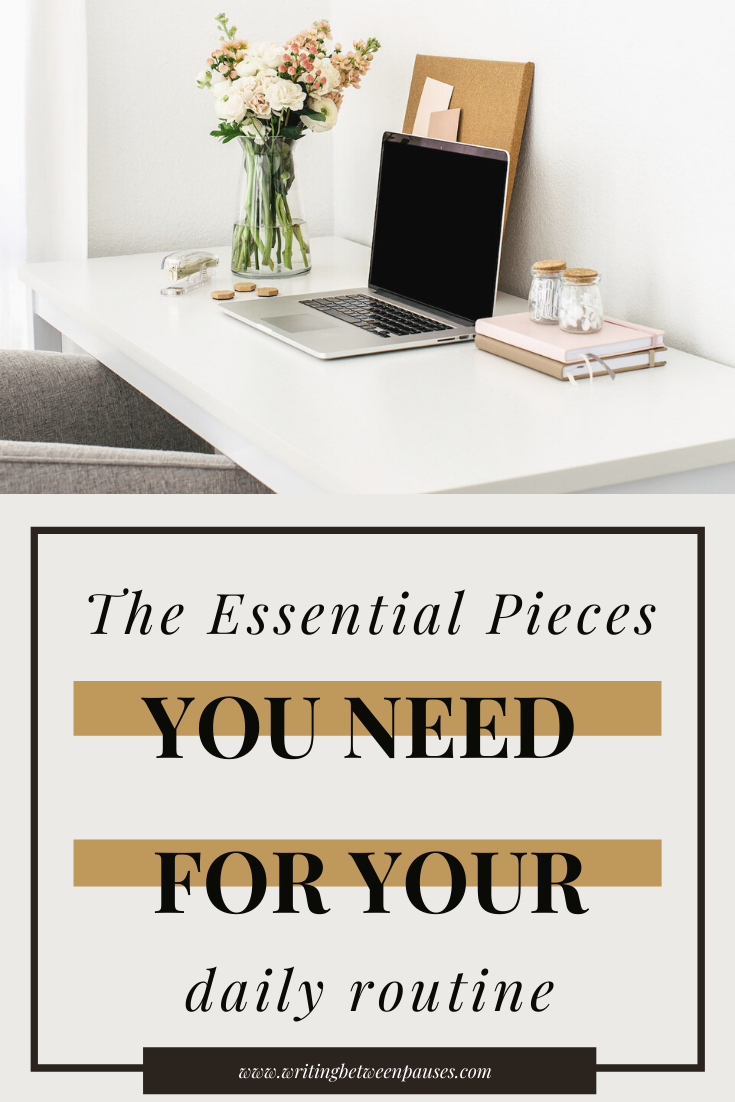Welcome to my new series all about routines. While developing my own routine over the last few weeks of stay-at-home orders and quarantine, I’ve found myself writing down notes about developing my routine, working from home, having kids, keeping self-care in my day, and staying sane! I wanted to share some of this information with you, to help you succeed and feel more rested, recharged, and productive. You’ll be able to check out all the posts from this series here.
I love daily routines.
I’ve read a lot of posts about daily routines.
I’ve read a lot of listicles about daily routines.
Planners that work perfectly. Systems that make is easier to stay on track. Methods of taking breaks and working and this and that.
The truth is: those things might work. But when it comes down to the essentials, there are 2 things I think you need:
A personality type that makes sense with a daily routine
A system that works for you.
If you don’t have the kind of personality type that thrives on routine, on doing the same thing every single day… I don’t think it’s for you. And that’s ok! There are tons of ways to be successful and to get your work done each day. For me, that revolves around a daily routine. But it might not be the same for you.
If you don’t know that for sure yet, however, and you want to give developing a routine a try… you’re in the right place. I want to help you create a system that works for you. And here are my essentials for making that happen.
1. A Planner That Works for You
Yes, you hear me: a planner that works for you. Right now, I’m using a combination of a weekly notepad (basically just a notepad with the days of the week on it) and a Daily Habits planner I impulse bought at Walmart, plus my 52 Lists Planner that I bought nearly a year ago. I use the 52 Lists Planner primarily for the monthly pages; the Daily Habits planner to keep track of my non-work to do lists; and the notepad for my daily priorities.
That’s my system. Part of my routine is checking my calendars every morning, copying down my various to do lists, and keeping everything organized.
That might sound like hell on Earth to you!
Find a planner that works for you. But my advice is you need a planner of some kind—an online to do system, like Check Up or monday.com, a physical planner, a notebook, whatever—to help you keep track of your daily schedule and what you need to get done.
2. A Calendar
Following the same line of thought, pick 1 calendar to keep everything on. I use my iCal synced to my Google Calendar to keep everything organized. Since I have multiple work-associated emails with their own separate calendars, I make sure that those sync to my iCal as well. If I have a deadline for anything, it goes to iCal. If I schedule a meeting, it goes to iCal. If I do anything, it goes on iCal. I keep it organized and it is my main place to look for my daily schedule: what I need to remember is time specific, what is coming up, and more.
I am normally highly in favor of paper calendars. However, for keeping all of these various dates organized, I would probably be lost without the option to sync things up! However, once again, pick what works for you.
3. Willingness to Assess What Works
At the end of every day, I ask myself one important question: did my system work today?
And then: if it didn’t work, what needs fixed?
I didn’t wake up a year ago and decide, “Well, I’m a freelancer now, I need this specific note pad and this planner.” I’ve been playing with my routine for months. I have always found that starting each day writing down my list of things to do was one way I kept myself on track. But how I did that, and how I made a routine out of it, took trial and error, reassessing what was and wasn’t working.
A prime example of this was, during the summer, I started each day by writing down a full timed out schedule. This felt like a good idea at the time, but I find it very hard to determine how long each task I do will take. Will my morning journaling session take 10 minutes or 30 minutes? Sometimes, I just write more than others! Will it take me 1 hour to write this blog post for a client or will I end up needing to do 3 hours of research, thereby throwing off my entire schedule? It just depends! That didn’t work for me so I stopped doing it. I found something else that worked.
For right now, I find keeping my “home” tasks separate from my “work” tasks works best. I try to focus 6 hours of my day purely on work, if I have that much work to do. Then, I start working from my other planner. It makes it easy for me to better block out my time—even if I can’t necessarily determine how long each individual task will take me.
There you have it: the 3 essential pieces to starting to create your daily routine. Next week, I’ll be sharing a few tips for actually piecing out your daily routine. Thanks for reading!




